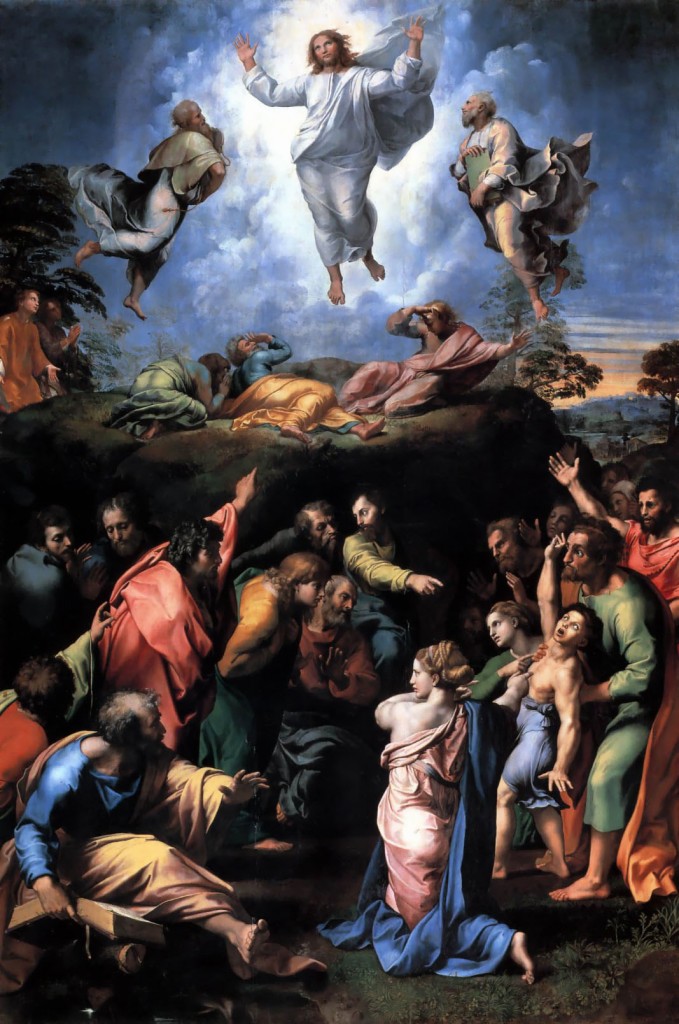And after six days Jesus took with him Peter and James and John, and led them up a high mountain by themselves. –Mark 9:2
That should be all we need to call to mind other mountains in scripture. Mountains are very important, they are where you meet God. Jerusalem is often referred to as a mountain. It too is where God’s people meet God. Other details in the story should connect this with another prophet who went up a mountain to talk to God, Moses (Exodus 32-34). Jesus became radiant white and a cloud came over them and from it the voice of God. Moses too became radiant, and his face shone even after leaving the mountain. God also spoke to Moses from a cloud. And as if that wasn’t blatant enough Jesus and his disciples actually met Moses.
Peter wasn’t that far off in wanting to build tents or tabernacle with God on this mountain. The first time we see Abraham climbs up a mountain he pitches a tent and builds an alter to the Lord(Genesis 12:8). Moses had done something similar, he had been on the mountain so long the people were getting anxious. And after all God had set up his people on the mountain of Moriah in Jerusalem, around his temple. Camping out with God is a good thing. But this time is different. Mountains and God had often been instances of death. Elijah plus God on the mountain equalled a bunch of dead false prophets, via fire from heaven. When Moses went up the mountain he came down to find the people worshiping a golden calf and 3000 of the false leaders were killed. I always thought it was interesting that Aaron doesn’t seem to get any of the blame. He blames the people for their unbelief.
So, it’s interesting that in Mark they weren’t allowed to camp, but they come down the mountain to a kerfuffle. The people and the leaders are in disarray. This time only the demon is defeated, the people are spared, but Jesus criticizes them for their unbelief. ““O faithless generation, how long am I to be with you? How long am I to bear with you? Bring him to me” Then the boy is healed, not killed. This is a different kind of kingdom, than they were expecting. This is a kingdom fighting spiritual war. Jesus comes down the mountain and instead of leading Israel to fight the Philistines and conquer the land. He enters the land and conquers a demon, one of many during his ministry. And just as the people were afraid to enter the land flowing with milk and honey, so too are they afraid to take care of the demon. It is very similar. I gave you this land, just go take it. I gave you power to move mountains now do it. Mark doesn’t focus on any sin the disciples might have been guilty of, as Matthew does. You could almost take the last line of the story as saying, you can’t fix the hearts of all the people, you just have to pray for them. And so we learn that even if the leaders are faithful it doesn’t matter, if the people have no faith.
We, the church, are about a slightly different work than the people of Israel. But it is still about the hearts of the people. It should be remembered that the faithless generation Jesus criticized was judged. About 40 years later the emperor Titus marched into Jerusalem and packed off the articles of the temple. Every person who clung to the old order and fought for the glory and restoration of the temple in Jerusalem was killed, down to the last man at Masada. While the church heeded Jesus message (Mark 13:14) and they fled to the hills and lived to fight another day. They worship at a new temple, the body of Christ (John 2:19).

